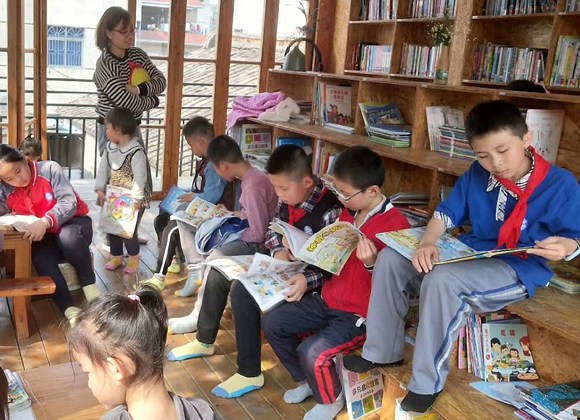
Elementary school students enjoy a library built over a garage in Xiamen, Fujian province, on Saturday, after donating books to the place.(Photo provided to China Daily)
A wooden cabin on the second floor of a cafe, with windows on all sides and a balcony shaded by trees, has become a prime reading place for migrant children in Gangtou village in Xiamen, Fujian province.
The inviting building was once the garage of Yan Yupeng, 34, who grew up in the village and is now a police officer.
In recent years, migrant workers have settled in the community because of cheap rents and its location in the rural part of the city.
"Thanks to my job, I have seen many suspects in court," Yan said. "Some were even sentenced to death." He added that most of them had grown up in poverty, and worries when he sees migrant parents ignore their children's education. Some kids have acquired bad habits, such as vulgar speech, he said.
"The families live in small rented rooms without reading desks. When I commute from downtown, I can feel the wide gap in the cultural atmosphere," Yan said.
With the idea of building a library, he collected about 80,000 yuan ($12,600) through crowdfunding via social media in April 2016. "I want to raise public attention in this way."
Many netizens supported the effort, but what pleases him most is that some villagers donated money, too.
"A butcher in the village brought some loose change with oil stains on it," he said.
On Children's Day in 2016, the 24-square-meter library opened on the upper floor of the garage, with a staircase leading to the ground only wide enough for one person to pass-dubbed the "stairs of humility".
"People run into each other in the narrow stairway. Those going upstairs should make way for the one going downstairs. Those going down should offer a smile," Yan said.
The library has many other unique rules. On their first three visits, readers should hold a bowl of water, almost full, and walk several meters, without spilling, to water the plants before being allowed in. It's to calm their minds, Yan said.
Another rule requires bare feet on the wooden floor-to get close to nature and keep clean. Washing hands before reading to protect and respect books. Gargling-remember to keep quiet and speak no rude words.
Kids are both guests and hosts at the library.
"The important thing is to teach them dedication, gratitude and self-management," said Yan, who asks his young guests to help clean the library to cultivate their sense of ownership.
With everything on the right track, Yan has invited others to manage the library. Su Huiye, a migrant mother, who used to sell breakfast in the nearby market, is now the library director.
"Her children often read here, so I encouraged her to try. She was not confident at first, but it turns out that she is doing a good job," said Yan, happy about the subtle change he sees happening.
Su said: "I hope the library will always be here, so my kids can read and join the activities. If one reads a lot, one will have more options in life."
Even though donations from kindhearted people can cover some expenses, Yan's next goal is to make the library financially self-sufficient.
He transformed the garage into a cafe, and an old stone house into a delicate hotel last year. The purpose is charity, with profits donated to support the library.
Some activities will be held in the cafe, and the hotel provides free accommodations for volunteers coming from distant places, Yan said.
The villagers didn't understand him at first, but now more are devoted to the charity work. Last month, the owners of another hotel and two restaurants promised to donate some of their monthly profits, he added.
"I am very happy that people are more confident about our village and willing to build it into a better home together," Yan said. "The light of a firefly may be faint, but a cluster of them can light up the sky."


















































